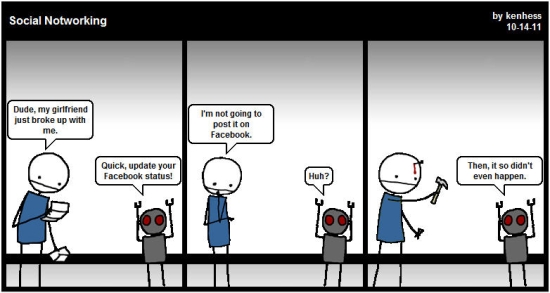And, it's not just the younger set (tweens, teens, twentysomethings) either, it's age and gender independent. People in their 30s, 40s, 50s and older are so into technology and social networking that observers, like myself, can no longer point the fickle finger of guilt at one particular age group or other demographic. People are absolutely obsessed with this new found connectivity and new level of "social" interaction, regardless of age or gender.
The Downside
There are some things in your life that you just let go by without a corresponding post to social networking sites. Inappropriate posts could jeopardize your job, your relationships or your safety. Revealing your nude or semi-nude body on Twitter can have dire consequences as has been noted by high-profile individuals such as Anthony Weiner and Lindsay Lohan. And, telling everyone when and where you're spending your awesome vacation is unsafe. It's an invitation to robbery or identity theft.
Perhaps a good rule of thumb for posting to social networking sites is to only post updates that could be read and viewed by children ten and younger. Yes, that puts quite a limit on those risque or off-color posts but you'll also never have to explain yourself later for them.
Ten Rules for Social Networking
- Don't post anything potentially incriminating; it will come back to haunt you.
- Don't update your status or mess with your phones during meals.
- Don't allow others to see your current location.
- Don't post what you had for breakfast, lunch or dinner.
- Don't post your vacation information or pictures until you return.
- Don't use the same password for all of your Social Networks.
- Don't tell anyone your Social Network site passwords.
- Keep private thoughts private.
- Don't bully or criticize anyone on social networking sites.
- Don't post pictures or videos depicting anything of a sexual, violent or criminal nature.
Good Manners are Always In Style
It seems to me that the new trend is anything goes: clothes, body art, body jewelry, the written word, the spoken word and manners. Do whatever makes you feel good is OK. That kind of self-centered attitude isn't conducive to a peaceful and productive society. Good manners, appropriate behavior, polite language and empathy haven't been tossed out with yesterday's newspaper. They still apply.
I've seen strangers and family members alike ignore what's going on in their immediate vicinity to text, update, tweet or telephone some distant acquaintance.
Here is a basic rule of thumb to live by in face to face (F2F) social situations: If you're too important or too involved in other activities to pay attention to what's going on around you (lunch, family gathering, church or any social situation), then you should excuse yourself, leave and go take care of whomever you're texting, Facebooking or chatting with on the other end of your electronic device.
so·cial [soh-shuhl]
adjective
- pertaining to, devoted to, or characterized by friendly companionship or relations: a social club.
- seeking or enjoying the companionship of others; friendly; sociable; gregarious.
- of, pertaining to, connected with, or suited to polite or fashionable society: a social event.
- living or disposed to live in companionship with others or in a community, rather than in isolation: People are social beings.
- of or pertaining to human society, especially as a body divided into classes according to status: social rank.
noun
- a social gathering or party, especially of or as given by an organized group: a church social.
net·work·ing [net-wur-king]
noun
- a supportive system of sharing information and services among individuals and groups having a common interest: Working mothers in the community use networking to help themselves manage successfully.
Social Networking Philosophy
In my opinion, social networking isn't really all that social. It is interaction but it isn't social. Social, by definition, (see above) is companionship and has to do with proximity of being. Alternatively, networking's definition is more similar to what's popularly known as social networking. It's networking but it isn't social. We should call it online networking. That is a more accurate definition of applications such as Twitter and Facebook.
I'll have a hard time convincing anyone to change the accepted, albeit incorrect, terminology.
But, like the tree that falls in the forest with no one around to hear the crash to the ground, just because you don't post the tidbits of your life, doesn't mean that they didn't happen. They just aren't public knowledge. And, that's the way it should be.
Acknowledgments:
Thanks to my wife, Melissa, who gave me the idea for this post by saying, "If it happens and you don't post it on Facebook, did it really happen?"
I created the Social Notworking comic strip on StripCreator.com. ExplodingDog characters are owned by Sam Brown of explodingdog.com.
Definitions taken from http://dictionary.reference.com

